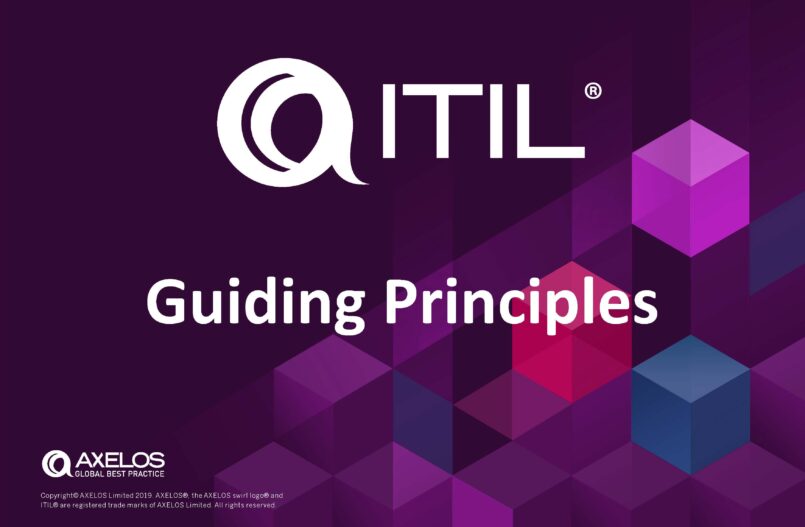by Greg Smith
Previous versions of ITIL provided the framework for an organization’s IT Service Management capability, but often lacked in offering the guidance needed to successfully implement change and make improvements. With the publication of ITIL 4 in February 2019, the inclusion of 7 “Guiding Principles” looks to fill this gap.
The 7 ITIL 4 Guiding Principles has immediate and practical use and should be shared with your teams to help make decisions and improvements.
Each of the Guiding Principles are to be used in concert and are meant for use in all facets of ITSM, focused on solid and productive decision making, and promote continuous improvement throughout IT.
The 7 ITIL 4 Guiding Principles are:
Focus on Value
The purpose of every IT organization should be to create value for its stakeholders. For this to happen, you need to understand who your stakeholders are, what outcomes they seek and how the services you provide help achieve those outcomes. Consideration is given to your service consumers, but don’t forget about your other stakeholders such as employees, industry regulators, shareholders, etc.
Start where you are
A lot of good work has gone into the point where you’re at now. Of course, it’s not perfect, but it’s usually better to improve on what you have and know than to throw it all away and start anew. Observation is key to determining the current state and what can be leveraged. Reviewing reports should be done to confirm observations, not in place of them.
Progress iteratively with feedback
Large-scale, long-term projects with a Big-Bang delivery at the end is an inappropriate approach to delivering value. Instead, work should be broken down into smaller, manageable pieces through which value can be delivered more quickly. Throughout each of these iterations, feedback is sought to ensure you’re delivering what is needed (especially if the situation and business needs have changed from when you started).
Collaborate and promote visibility
Improve efficiency and support by working together across boundary lines towards the common goal. Remove personal agendas and siloed ways of working. Build trust through transparency. Share what’s happening and progress (and challenges) with all stakeholders. An informed and included group produce the greatest results.
Think and work holistically
ITIL 4 refers to the “Four Dimensions” model of Service Management:
- Organizations and people
- Information and technology
- Partners and suppliers
- Value streams and processes
It is imperative that each of these Dimensions are considered. Every part, process, department and supplier involved must consider its role and be directed and maintained towards the common goal to ensure the desired outcomes are delivered.
Keep it simple and practical
Simplify complex work through the elimination of anything (processes, procedures, metrics, etc.) that does not add value in support of stakeholders achieving their desired outcomes. Use the minimum number of steps that are needed and if a complex set of steps exist, ask “why” for each step and eliminate all for which there isn’t a strong, current reason (hint: “We’ve always done it this way.” is not a strong reason.).
Optimize and automate
There has always been interest in automation within IT. Use people and manual work for those tasks which cannot be automated. However, the initial focus should be on optimization to ensure efficiency and effectiveness, then look to automate. If the sole focus is on automation, it’s likely you’ll do the wrong thing – only faster!
The Guiding Principles are what advocates and users of ITIL have been yearning to see for years. They’re a practical and useful set to share and embed immediately with your teams. Using them whenever you’re making decisions and improvements will ensure you’re successful at creating Value for your customers and organization.
As always, OwlPoint is here to help you with all your ITIL/ITSM projects. Never hesitate to reach out with questions. If you are interested in ITIL 4 consulting, please contact OwlPoint at [email protected] or 888-992-9695 to schedule a time to discuss for the company’s needs.


